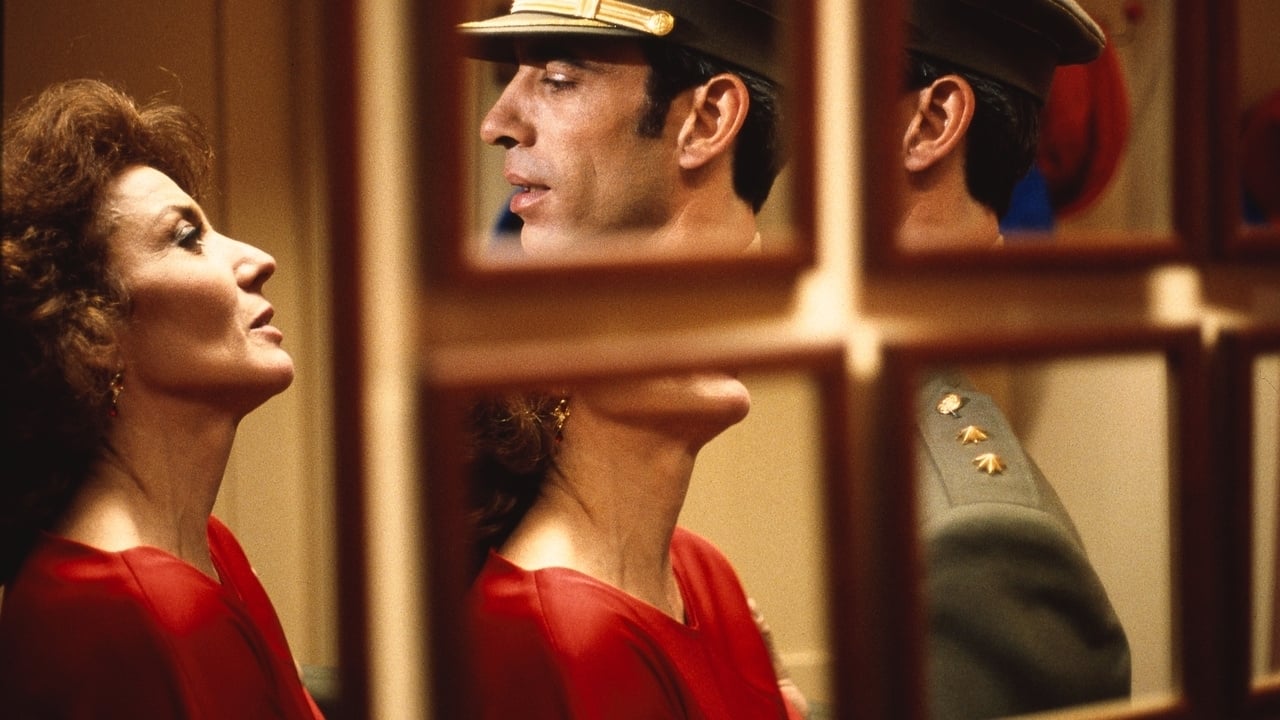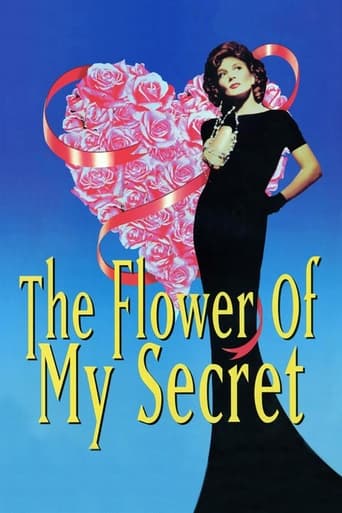



Let's be realistic.
Your blood may run cold, but you now find yourself pinioned to the story.
View MoreOk... Let's be honest. It cannot be the best movie but is quite enjoyable. The movie has the potential to develop a great plot for future movies
View MoreAfter playing with our expectations, this turns out to be a very different sort of film.
View MoreHere we have another woman on the verge of a nervous breakdown; a key theme in Almodóvar's work, and one that is treated in this film with empathy and sensitivity, as opposed to the director's usual fondness for colourful farce. Nonetheless, the film can now be seen as a real turning point in the filmmaker's career; following on from the over-the-top stylisations and outré black-humour of the controversial Kika (1993), and pointing instead towards to the more commercial and acclaimed likes of All About My Mother (1999), Talk to Her (2002) and Volver (2006). For me, it's one of the director's greatest achievements thus far; a clever narrative attached to a complicated character filled with desires and anxieties that is all captured in such a way as to prove once and for all that Almodóvar is the rightful heir to the cinematic throne of Rainer Werner Fassbinder.There are a number of subtle Fassbinder touches littered throughout The Flower of My Secret (1995) that seem particularly attuned to a similar sense of spiralling melodrama; such as the constant reliance on self-aware film references to underline key elements of the plot, and the clever use of fragmented reflections stressing the dithering uncertainty of the character and the different components of her life as it crumbles into pieces all around. However, despite such similarities, Almodóvar's cinema is ultimately his own; and The Flower of My Secret is indicative of his more mature work in its use of colour, humour, energy and flair. Unlike Fassbinder, there is a real sense of warmth to the drama here, and a real sense of vigour and immediacy that will be recognisable to viewers already accustomed to the director's keen style and approach. In keeping with this, we have the sense of kitsch and knowingly melodramatic soap-opera clichés used and eventually subverted in order to bring the most out of both the character and her seemingly hopeless situation; as she struggles with the breakdown of her marriage to a young soldier, dysfunction between her mother and sister, an unfulfilled career as a writer of vapid romance novels, and a sense of stagnation as she strives to pull the separate elements of her life back together.It's all typical of Almodóvar's approach to storytelling; filled with numerous layers of self-reference and keen elements of meta-fiction; as the themes of the story and the thoughts and feelings of the characters are underpinned and eventually abstracted by secondary elements that comment on the story at hand - while ultimately remaining disconnected. Once again, we have an Almodóvar film about a writer - in which the project she is working on becomes interlinked with the story of the film - as well a separate framing-devise about the publication of a screenplay that is essential to the plot itself. It also begins, like the earlier masterpiece Law of Desire (1987), with a scene of abstraction; in which a scene that we believe to be part of the film itself turns out to be a separate element linked to the character's job, creating a further element of self reference that is really incredibly clever.Think about this opening sequence in itself; what are we seeing? The woman is concerned about the fate of her son, who she loves very dearly. The doctors tell her that worrying is useless; that her son - although still showing signs of life - is essentially dead. He is no longer responding to treatment and his brain is shutting down. This brief vignette - which later turns out to be a training video - encapsulates the central idea of The Flower of My Secret; with the predicament of the mother and her teenage son mirroring that of the central character and her relationship with her young husband. The relationship is dead, though the woman refuses to let go. She begs and pleads and prays for some kind of return to how things used to be, but it is ultimately hopeless. The sadness of the central character consumes her to the point in which her life becomes the antithesis of the generally accepted conventions of her trashy romance novels. There's also a continual reliance on the idea of performance - be it the dance, which suggests elements of the subsequent Talk to Her, or the acting that opens the film - and how this relates to the subtle shading of the characters, their attitudes and relationships, the characters as cineasts and the importance of the pseudonym.So the film works on a number of levels, with the various shades of reference and interpretation adding to the overall effect of the story, which is closely linked throughout to the feelings of the character. It is also worth noting the truly exceptional performances from the cast, and in particular the lead performance of Marisa Paredes; one of the most affecting, heartbreaking and subtly complex portrayals of any Almodóvar work to date. It is, without question, a great ensemble piece - as is often the case with the director - but the feelings of this character, her hopelessness and the general turmoil of middle-age, loneliness and creative dissatisfaction all resonate on a completely profound level. Some viewers have found fault with the film, and that's clearly a difference of taste; however, for me, this is one of Almodóvar's best and brightest; a film filled with pathos, humour, character and emotion, all jostling for our attention within a clever script, and the always inventive direction of Almodóvar himself.
View MoreSome viewers have placed this exciting film 'La Flor de mi secreto' into the 'not up to standard' Pedro Almodóvar films, a classification this viewer finds difficult to understand. Filmed in the luxuriously colorful palette (especially the repeated use of the color red in every scene) that has become his trademark, set with a musical score that includes Spanish song and guitar and flamenco, and introducing a wildly disparate group of over-the-top women played by a bevy of fine actresses - it all seems echt Almodóvar to me. No, there is not the outrageous side of gender bending that suffuses many of his more popular films, but there is a fine story that resonates throughout this remarkable movie that makes it very much worth the attention of lovers of Spanish cinema.The film opens during the credits on a woman being informed that her 16-year old son is brain dead as a result of a motorcycle accident and two young doctors (including the irrepressible young Jordi Molla) are trying to convince her to allow the respirator to be disconnected and the boy's organs harvested for donor transplant. Sad, tense though this opening is we discover soon enough that the trio are actors making a demo film for medical personnel to learn to deal with such possible family encounters! Point: what appears to be a tragedy becomes a 'farcical depiction' guided by a seminar leader Betty (Carmen Elías). Flash into a different scene and we me Leo (the immensely talented Almodóvar favorite Marisa Paredes), depressed to the extreme over the failure of her marriage to her beloved Paco (Imanol Arias), a NATO 'soldier' who took assignments as far from Leo as possible. Now Leo continues to write her trashy novels she has never had published while clinging to the Paco (she wears his clothes, currently his boots) she cannot recover. Noting that the boots are too tight she leaves her typewriter to flee into the streets to find someone to remove the painful boots and after frustrating encounters with less than helpful people, she turns to her best friend Betty (yes, at a seminar!) who successfully removes the shoes. It seems Paco had an affair with Betty, a fact that further flails at Leo's pain. Betty assuages her by introducing her to a literary editor Ángel (Juan Echanove) who asks Leo to come on staff as a critic - most particularly to review the 'example manuscript' Leo has presented him in applying for the job. The reaction is predictable and Leo is at odds with how to continue her life.Along the way of the story Leo gets advice from her hilarious mother and sister (Chus Lampreave and Rossy De Palma in typical Almodóvar creations!) and from her maid Blanca (Manuela Vargas) and Blanca's son Antonio (Joaquín Cortés) who perform Spanish ballet as a side line (and incredibly well, too - with some wonderful flamencoesque moments of artistic relief). Coincidences happen that allow Leo to ultimately catch a new perspective on her life without Paco - in a most unexpected way.So what is not to love about this Almodóvar opus? For this viewer, absolutely nothing. It is a delight from beginning to end and deserves reconsideration in placement in the gifted director's echelon of works. Highly Recommended.
View More"The Flower of My Secret" follows a middle-aged married woman and somewhat neurotic novelist, Leo (Paredes), on the verge of divorce from the handwriting on the wall to the separation to the final realization and adjustments required to get her life back on track. There's little plot to be found in this linear dramady which sees Leo bumping into the people in her life for brief tete-a-tetes and bouncing off her emotional walls as she tries to cope with the inevitable. Not Almodovar's best work, this busy, mildly humorous, dialogue-intensive contempo Spanish flick received mild approval from critical corners and the public alike. Short on story but very well composed, "The Flower of My Secret" will play best with women, especially Spanish speakers or foreign film buffs. (B)
View MorePedro Almodovar is easily one of the most interesting filmmakers in the world today and most of his films are in a strange way tongue in cheek, despite the premise of the story! But in this film its a more serious Almodovar story and while never boring, I'm not sure it succeeds on the level it wants. Story is about a woman who is a very famous writer but writes under a pseudonym. She hates her own work and is hired by a magazine to do a story on herself (They don't know she is the same person). Marisa Paredes is Leo and as she enters middle age she seems to be going through a mid-life crisis. She drinks to much and her marriage is falling apart. Her husband Paco (Imanol Aris) is in the military and always gone. Its evident he does not miss her but Leo looks forward to when he comes home. Definitely a more somber and straight laced story by one of the most irreverent directors in ages. Paredes is always captivating and she seems at ease playing women with deep rooted problems. Film follows her as Leo must learn all over again how to enjoy life and most important, to like herself! Slow moving film as some genuine moments from Paredes but its not one of Almodovars better efforts.
View More